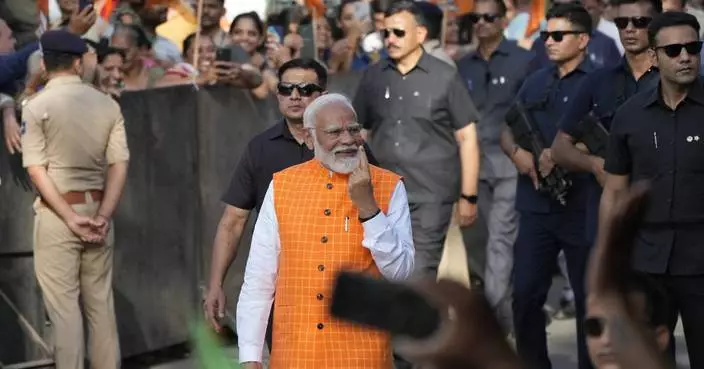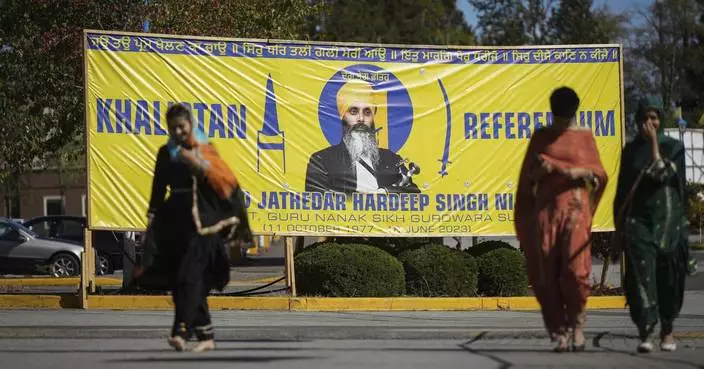Architect and educator Balkrishna Doshi, best-known for his innovative work designing low-cost housing, has been awarded the 2018 Pritzker Architecture Prize, the first Indian to win architecture's highest honor in its 40-year history.
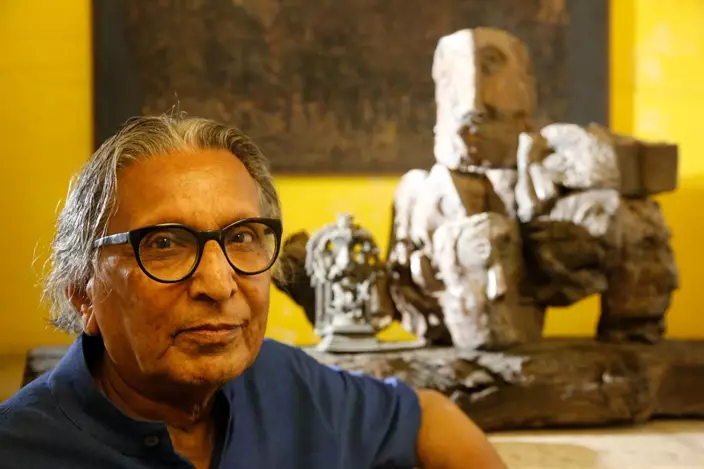
India's Balkrishna Doshi who won the 2018 Pritzker Architecture Prize poses for the Associated Press at his home in Ahmadabad, India, Wednesday, March 7, 2018. (AP Photo/Ajit Solanki)
The award was announced Wednesday by Tom Pritzker of the Chicago-based Hyatt Foundation.
Click to Gallery
Architect and educator Balkrishna Doshi, best-known for his innovative work designing low-cost housing, has been awarded the 2018 Pritzker Architecture Prize, the first Indian to win architecture's highest honor in its 40-year history.
The award was announced Wednesday by Tom Pritzker of the Chicago-based Hyatt Foundation.
The housing itself, he said, can transform how residents see their world. "Now, their life has changed. They feel hopeful," he said. "They have ownership of something."
The prize citation noted how their influence "can be seen in the robust forms of concrete which he employed."
While the work of Pritzker winners are often scattered across the globe, Doshi is known for working almost completely in his homeland, designing buildings for government offices, companies and universities.
Doshi has been an architect, urban planner, and educator for 70 years. The foundation called the 90-year-old's work "poetic and functional," and noted his ability to create works that both respect eastern culture and enhance quality of life in India.
Among Doshi's achievements: the Aranya low-cost housing project in Indore, which accommodates over 80,000 people, many of them poor, through a system of houses, courtyards and internal pathways.
Reached at home in the western city of Ahmedabad, Doshi said his life's work has been "to empower the have-nots, the people who have nothing."

India's Balkrishna Doshi who won the 2018 Pritzker Architecture Prize poses for the Associated Press at his home in Ahmadabad, India, Wednesday, March 7, 2018. (AP Photo/Ajit Solanki)
The housing itself, he said, can transform how residents see their world. "Now, their life has changed. They feel hopeful," he said. "They have ownership of something."
He called the prize an honor both for himself and for India.
"What I have done for close to the last 60 years, working in rural areas, working in low-cost housing, worrying about India's future. Now all this comes together and gives me a chance to say "Here we are!" he said.
Indian Prime Minister Narendra Modi tweeted his congratulations.
"This honour is a fitting recognition of his outstanding work, which has spanned decades and made a notable contribution to society," He said.
Doshi was influenced early by two of the great 20th-century architects, Charles-Edouard Jeanneret, known as Le Corbusier, and Louis Kahn.

This photo provided by The Pritzker Architecture Prize shows Balkrishna Doshi of India winner of the 2018 Pritzker Architecture Prize, the highest honor in the field, announced Wednesday, March 7, 2018. (Courtesy of The Pritzker Architecture Prize/Vastushilpa Foundation via AP)
The prize citation noted how their influence "can be seen in the robust forms of concrete which he employed."
But he grew into his own. "With an understanding and appreciation of the deep traditions of India's architecture, he united prefabrication and local craft and developed a vocabulary in harmony with the history, culture, local traditions and the changing times of his home country India," the citation read.
Doshi's work ranges from the blocky, concrete Life Insurance Corporation Housing buildings in Ahmedabad to the naturalist curves of that city's Amdavad ni Gufa underground art gallery.
"My work is the story of my life, continuously evolving, changing and searching . searching to take away the role of architecture, and look only at life," the prize announcement quoted him as saying.

This photo provided by The Pritzker Architecture Prize shows the Aranya low-cost housing project by Balkrishna Doshi in Indore, India, which accommodates over 80,000 people through a system of houses, courtyards and internal pathways. (Courtesy of The Pritzker Architecture Prize/Vastushilpa Foundation via AP)
While the work of Pritzker winners are often scattered across the globe, Doshi is known for working almost completely in his homeland, designing buildings for government offices, companies and universities.
Born in 1927 in the city of Pune, Doshi studied architecture in Mumbai and later worked under Le Corbusier, overseeing his projects in the cities of Chandigarh and Ahmedabad. He was the founding director of Ahmedabad's School of Architecture and Planning, which is now known as CEPT University.
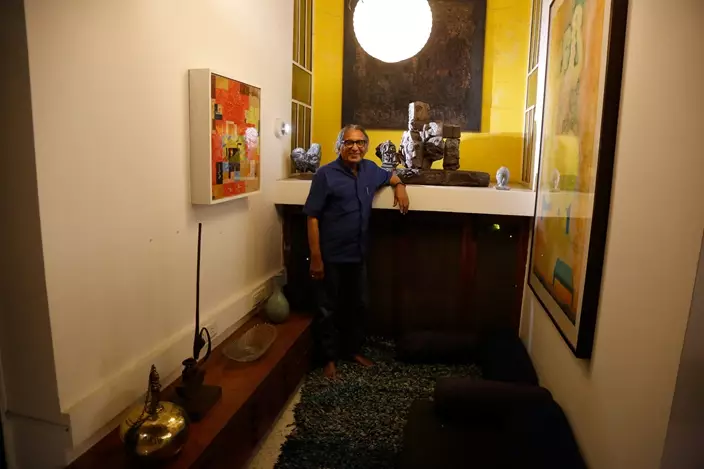
India's Balkrishna Doshi who won the 2018 Pritzker Architecture Prize poses for the Associated Press at his home in Ahmadabad, India, Wednesday, March 7, 2018. (AP Photo/Ajit Solanki)
He founded his own practice in 1956, and lives and works in Ahmedabad.
Doshi will be formally awarded the prize in a May ceremony at the Aga Khan Museum in Toronto.
SURREY, British Columbia (AP) — Three Indian men charged with killing Sikh separatist leader Hardeep Singh Nijjar in British Columbia last year have appeared in court in the case that set off a diplomatic spat after Canadian Prime Minister Justin Trudeau said there were “credible allegations” of Indian involvement.
Canadian police had arrested the three Indian men last week in Edmonton, Alberta, and they have been charged with first-degree murder and conspiracy to commit murder.
Canadian Mounted Police Superintendent Mandeep Mooker said Friday that the investigation into whether the men had ties to India's government was ongoing.
Nijjar, 45, was shot to death in his pickup truck last June after he left the Sikh temple he led in the city of Surrey. An Indian-born citizen of Canada, he owned a plumbing business and was a leader in what remains of a once-strong movement to create an independent Sikh homeland. India designated him a terrorist in 2020 and at the time of his death had been seeking his arrest for alleged involvement in an attack on a Hindu priest.
India has denied involvement in the slaying. In response to the allegations, India told Canada last year to remove 41 of its 62 diplomats in the country. Tensions remain but have somewhat eased since.
The arrested men — Kamalpreet Singh, 22, Karan Brar, 22, and Karanpreet Singh, 28 — appeared in court Tuesday via a video link and agreed to a trial in English. They were ordered to appear in British Columbia Provincial Court again on May 21.
Brar and Karanpreet Singh appeared in the morning. Kamalpreet’s appearance was delayed until the afternoon as he waited to speak to a lawyer.
The small provincial courtroom was filled with spectators during the morning session. Others crowded into an overflow room to watch the proceedings via video.
Richard Fowler, the defense lawyer representing Brar, said the case will eventually be moved to the Supreme Court and combined into one case.
About 100 people gathered outside the courthouse waving yellow flags and holding photos of Indian government officials whom they accuse of being involved in Nijjar’s killing.
Canadian police say the three suspects had been living in Canada as non-permanent residents.
A bloody decadelong Sikh insurgency shook north India in the 1970s and 1980s until it was crushed in a government crackdown in which thousands of people were killed, including prominent Sikh leaders.
The Khalistan homeland movement has lost much of its political power but still has supporters in the Indian state of Punjab, as well as in the sizable overseas Sikh diaspora. While the active insurgency ended years ago, the Indian government has repeatedly warned that Sikh separatists were trying to make a comeback.
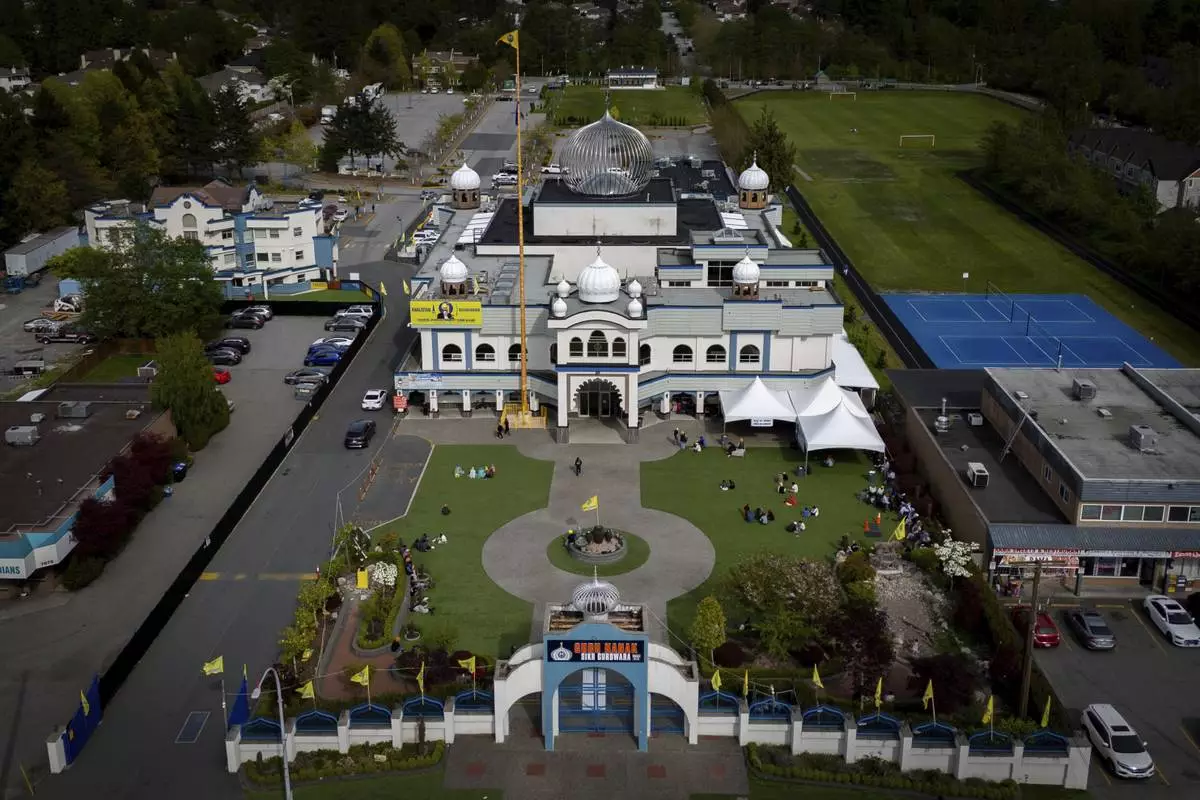
In this photograph taken with a drone, people sit on the front lawn of the Guru Nanak Sikh Gurdwara, in Surrey, B.C. on Friday, May 3, 2024. (Ethan Cairns/The Canadian Press via AP)
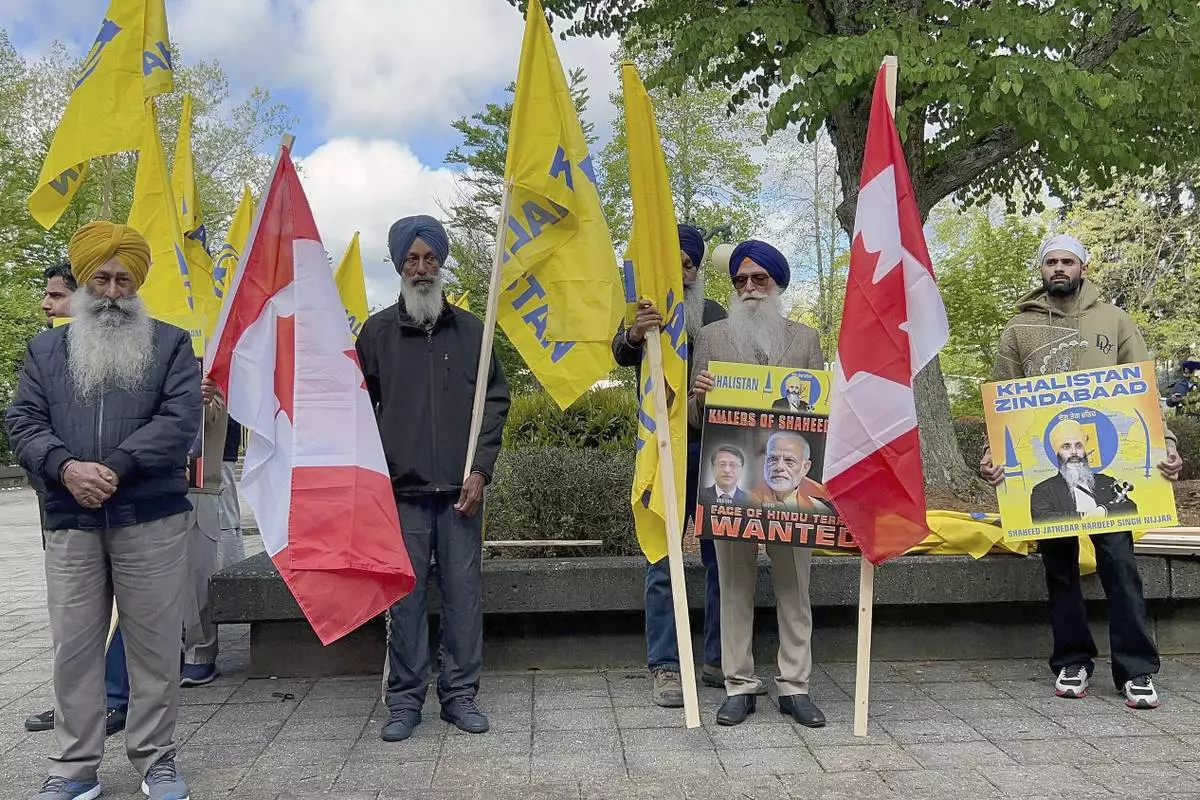
Members of British Columbia's Sikh community gather in front of the courthouse in Surrey, British Columbia, Tuesday, May 7, 2024. Three men accused of murdering temple leader Hardeep Singh Nijjar made their first court appearance by video. (Chuck Chiang/The Canadian Press via AP)
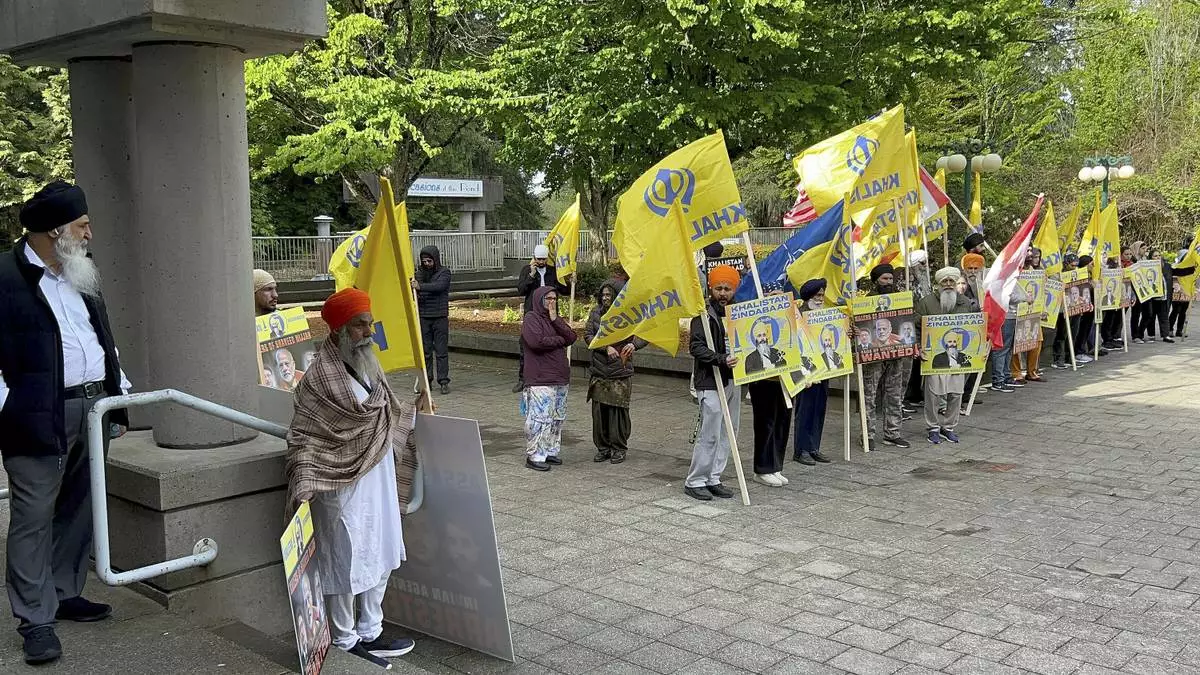
Members of British Columbia's Sikh community gather in front of the courthouse in Surrey, British Columbia, Tuesday, May 7, 2024. Three men accused of murdering temple leader Hardeep Singh Nijjar made their first court appearance by video. (Chuck Chiang/The Canadian Press via AP)

This undated photo released by the Royal Canadian Mounted Police shows suspect Karan Brar, who was arrested in Edmonton, Alberta, on Friday, May 3, 2024, in the slaying of Hardeep Singh Nijjar. Canadian police say they arrested three suspects in the slaying of the Sikh separatist leader last June that become the center of a diplomatic spat with India, and are investigating possible ties between the detainees and the Indian government. (Royal Canadian Mounted Police via AP)
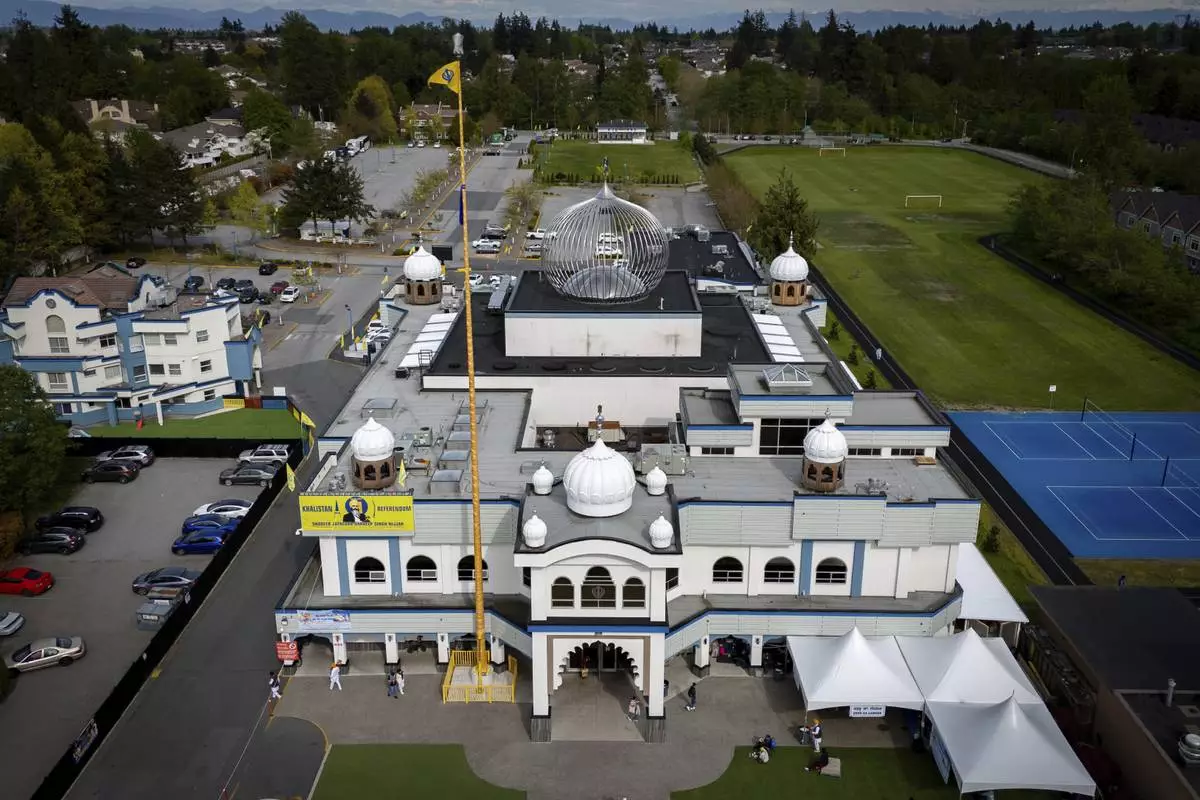
In this photograph taken with a drone, people sit on the front lawn of the Guru Nanak Sikh Gurdwara, in Surrey, B.C. on Friday, May 3, 2024. (Ethan Cairns/The Canadian Press via AP)

Superintendent Mandeep Mooker, Officer-in-Charge of IHIT listens to questions from media during a news conference for an update on the Hardeep Singh Nijjar homicide investigation from June 18, 2023, in Surrey, B.C., Friday, May 3, 2024. (Ethan Cairns/The Canadian Press via AP)















